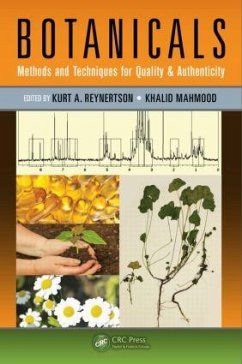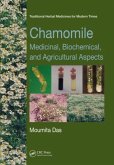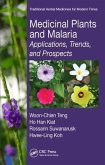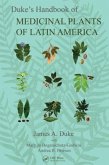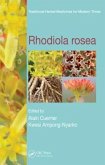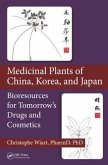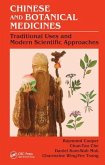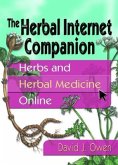Botanicals
Methods and Techniques for Quality & Authenticity
Herausgeber: Reynertson, Kurt; Mahmood, Khalid
Botanicals
Methods and Techniques for Quality & Authenticity
Herausgeber: Reynertson, Kurt; Mahmood, Khalid
- Gebundenes Buch
- Merkliste
- Auf die Merkliste
- Bewerten Bewerten
- Teilen
- Produkt teilen
- Produkterinnerung
- Produkterinnerung
The international trade in plants is growing steadily as the worldwide demand for natural and botanical raw materials increases. In order to build assurance into the sourcing of natural ingredients, R&D organizations must have valid scientific matrices to authenticate the quality of those ingredients, provide traceability, and minimize risk. An assemblage of insight from expert contributors, this book compiles a range of methods and techniques that can be used to assure the quality, authenticity, and traceability of botanical raw materials for dietary supplements, cosmetics, and natural products research.…mehr
Andere Kunden interessierten sich auch für
![Chamomile Chamomile]() Moumita DasChamomile240,99 €
Moumita DasChamomile240,99 €![Medicinal Plants and Malaria Medicinal Plants and Malaria]() Woon-Chien TengMedicinal Plants and Malaria241,99 €
Woon-Chien TengMedicinal Plants and Malaria241,99 €![Duke's Handbook of Medicinal Plants of Latin America Duke's Handbook of Medicinal Plants of Latin America]() James A DukeDuke's Handbook of Medicinal Plants of Latin America294,99 €
James A DukeDuke's Handbook of Medicinal Plants of Latin America294,99 €![Rhodiola Rosea Rhodiola Rosea]() Rhodiola Rosea241,99 €
Rhodiola Rosea241,99 €![Medicinal Plants of China, Korea, and Japan Medicinal Plants of China, Korea, and Japan]() Christophe WiartMedicinal Plants of China, Korea, and Japan262,99 €
Christophe WiartMedicinal Plants of China, Korea, and Japan262,99 €![Chinese and Botanical Medicines Chinese and Botanical Medicines]() Raymond CooperChinese and Botanical Medicines168,99 €
Raymond CooperChinese and Botanical Medicines168,99 €![The Herbal Internet Companion The Herbal Internet Companion]() David J OwenThe Herbal Internet Companion139,99 €
David J OwenThe Herbal Internet Companion139,99 €-
-
-
The international trade in plants is growing steadily as the worldwide demand for natural and botanical raw materials increases. In order to build assurance into the sourcing of natural ingredients, R&D organizations must have valid scientific matrices to authenticate the quality of those ingredients, provide traceability, and minimize risk. An assemblage of insight from expert contributors, this book compiles a range of methods and techniques that can be used to assure the quality, authenticity, and traceability of botanical raw materials for dietary supplements, cosmetics, and natural products research.
Hinweis: Dieser Artikel kann nur an eine deutsche Lieferadresse ausgeliefert werden.
Hinweis: Dieser Artikel kann nur an eine deutsche Lieferadresse ausgeliefert werden.
Produktdetails
- Produktdetails
- Verlag: CRC Press
- Seitenzahl: 332
- Erscheinungstermin: 1. Januar 2015
- Englisch
- Abmessung: 231mm x 152mm x 23mm
- Gewicht: 599g
- ISBN-13: 9781466598416
- ISBN-10: 1466598417
- Artikelnr.: 40495464
- Herstellerkennzeichnung
- Libri GmbH
- Europaallee 1
- 36244 Bad Hersfeld
- gpsr@libri.de
- Verlag: CRC Press
- Seitenzahl: 332
- Erscheinungstermin: 1. Januar 2015
- Englisch
- Abmessung: 231mm x 152mm x 23mm
- Gewicht: 599g
- ISBN-13: 9781466598416
- ISBN-10: 1466598417
- Artikelnr.: 40495464
- Herstellerkennzeichnung
- Libri GmbH
- Europaallee 1
- 36244 Bad Hersfeld
- gpsr@libri.de
Kurt A. Reynertson has worked in natural products chemistry for over 15 years and published numerous research articles in international journals. He completed his PhD in phytochemistry at the City University of New York and worked as a postdoctoral researcher in cancer pharmacology at Weill Cornell Medical College before joining the Naturals Platform team at Johnson & Johnson Consumer Products, Inc. His work is primarily focused on early discovery R&D, which puts him on the front lines of botanical quality and authenticity issues. Khalid Mahmood earned a PhD in organic synthesis chemistry from the University of Karachi in Pakistan. Since his arrival in the United States, he has accumulated significant exposure in the areas of brain receptor research at University of Pittsburgh and consumer products research working for small-sized companies in Illinois and California. For the past eight years, Dr. Mahmood has been the Naturals Platform leader at Johnson & Johnson Consumer Products, Inc. His combined experience from various sectors has helped him obtain inventorships on eight patents and multiple patent applications for natural technologies useful for personal care products.
The Importance of Quality and Authenticity for Botanical R&D. The
Importance of Proper Selection of Product Quality Specifications and
Methods of Analysis for Botanical Product Evaluation. Cultivating
Botanicals for Sensory Quality: From Good Agricultural Practices to Taste
Discernment by Smallholder Tea Farmers. Using Traditional Taxonomy and
Vouchers in Authentication and Quality Control. The DNA Toolkit: A
Practical User's Guide to Genetic Methods of Botanical Authentication.
Metabolic Profiling and Proper Identification of Botanicals: A Case Study
of Black Cohosh. A Model for Nontargeted Detection of Adulterants. The
Promise of Class Prediction: How Multivariate Statistics Can Help Determine
Botanical Quality and Authenticity. Conformation of Botanical or Bio- Based
Materials by Radiocarbon and Stable Isotope Ratio Analysis. Botanical
Isoscapes: Emerging Stable Isotope Tools for Authentication and Geographic
Sourcing. Nuclear Magnetic Resonance: A Revolutionary Tool for
Nutraceutical Analysis. Quality and Authenticity of Complex Natural
Mixtures: Analysis of Honey Using NMR Spectroscopy and Statistics.
Application of CRAFT to Data Reduction of NMR Spectra of Botanical Samples.
Practical Use of FT-NIR for Identification and Qualification of Botanicals:
A Fit-for-Purpose Approach. High-Performance Thin-Layer Chromatography for
the Identification of Botanical Materials and the Detection of
Adulteration. Sensory and Chemical Fingerprinting Aids Quality and
Authentication of Ingredients and Raw Materials of Vegetal Origin. The
Hidden Face of Botanical Identity: An Industrial Perspective on Challenges
from Natural Variability and Commercial Processes on Botanical
Authenticity. Aspects of Quality Issues Faced by Botanicals Used as
Cosmetic Ingredients. Index.
Importance of Proper Selection of Product Quality Specifications and
Methods of Analysis for Botanical Product Evaluation. Cultivating
Botanicals for Sensory Quality: From Good Agricultural Practices to Taste
Discernment by Smallholder Tea Farmers. Using Traditional Taxonomy and
Vouchers in Authentication and Quality Control. The DNA Toolkit: A
Practical User's Guide to Genetic Methods of Botanical Authentication.
Metabolic Profiling and Proper Identification of Botanicals: A Case Study
of Black Cohosh. A Model for Nontargeted Detection of Adulterants. The
Promise of Class Prediction: How Multivariate Statistics Can Help Determine
Botanical Quality and Authenticity. Conformation of Botanical or Bio- Based
Materials by Radiocarbon and Stable Isotope Ratio Analysis. Botanical
Isoscapes: Emerging Stable Isotope Tools for Authentication and Geographic
Sourcing. Nuclear Magnetic Resonance: A Revolutionary Tool for
Nutraceutical Analysis. Quality and Authenticity of Complex Natural
Mixtures: Analysis of Honey Using NMR Spectroscopy and Statistics.
Application of CRAFT to Data Reduction of NMR Spectra of Botanical Samples.
Practical Use of FT-NIR for Identification and Qualification of Botanicals:
A Fit-for-Purpose Approach. High-Performance Thin-Layer Chromatography for
the Identification of Botanical Materials and the Detection of
Adulteration. Sensory and Chemical Fingerprinting Aids Quality and
Authentication of Ingredients and Raw Materials of Vegetal Origin. The
Hidden Face of Botanical Identity: An Industrial Perspective on Challenges
from Natural Variability and Commercial Processes on Botanical
Authenticity. Aspects of Quality Issues Faced by Botanicals Used as
Cosmetic Ingredients. Index.
The Importance of Quality and Authenticity for Botanical R&D. The
Importance of Proper Selection of Product Quality Specifications and
Methods of Analysis for Botanical Product Evaluation. Cultivating
Botanicals for Sensory Quality: From Good Agricultural Practices to Taste
Discernment by Smallholder Tea Farmers. Using Traditional Taxonomy and
Vouchers in Authentication and Quality Control. The DNA Toolkit: A
Practical User's Guide to Genetic Methods of Botanical Authentication.
Metabolic Profiling and Proper Identification of Botanicals: A Case Study
of Black Cohosh. A Model for Nontargeted Detection of Adulterants. The
Promise of Class Prediction: How Multivariate Statistics Can Help Determine
Botanical Quality and Authenticity. Conformation of Botanical or Bio- Based
Materials by Radiocarbon and Stable Isotope Ratio Analysis. Botanical
Isoscapes: Emerging Stable Isotope Tools for Authentication and Geographic
Sourcing. Nuclear Magnetic Resonance: A Revolutionary Tool for
Nutraceutical Analysis. Quality and Authenticity of Complex Natural
Mixtures: Analysis of Honey Using NMR Spectroscopy and Statistics.
Application of CRAFT to Data Reduction of NMR Spectra of Botanical Samples.
Practical Use of FT-NIR for Identification and Qualification of Botanicals:
A Fit-for-Purpose Approach. High-Performance Thin-Layer Chromatography for
the Identification of Botanical Materials and the Detection of
Adulteration. Sensory and Chemical Fingerprinting Aids Quality and
Authentication of Ingredients and Raw Materials of Vegetal Origin. The
Hidden Face of Botanical Identity: An Industrial Perspective on Challenges
from Natural Variability and Commercial Processes on Botanical
Authenticity. Aspects of Quality Issues Faced by Botanicals Used as
Cosmetic Ingredients. Index.
Importance of Proper Selection of Product Quality Specifications and
Methods of Analysis for Botanical Product Evaluation. Cultivating
Botanicals for Sensory Quality: From Good Agricultural Practices to Taste
Discernment by Smallholder Tea Farmers. Using Traditional Taxonomy and
Vouchers in Authentication and Quality Control. The DNA Toolkit: A
Practical User's Guide to Genetic Methods of Botanical Authentication.
Metabolic Profiling and Proper Identification of Botanicals: A Case Study
of Black Cohosh. A Model for Nontargeted Detection of Adulterants. The
Promise of Class Prediction: How Multivariate Statistics Can Help Determine
Botanical Quality and Authenticity. Conformation of Botanical or Bio- Based
Materials by Radiocarbon and Stable Isotope Ratio Analysis. Botanical
Isoscapes: Emerging Stable Isotope Tools for Authentication and Geographic
Sourcing. Nuclear Magnetic Resonance: A Revolutionary Tool for
Nutraceutical Analysis. Quality and Authenticity of Complex Natural
Mixtures: Analysis of Honey Using NMR Spectroscopy and Statistics.
Application of CRAFT to Data Reduction of NMR Spectra of Botanical Samples.
Practical Use of FT-NIR for Identification and Qualification of Botanicals:
A Fit-for-Purpose Approach. High-Performance Thin-Layer Chromatography for
the Identification of Botanical Materials and the Detection of
Adulteration. Sensory and Chemical Fingerprinting Aids Quality and
Authentication of Ingredients and Raw Materials of Vegetal Origin. The
Hidden Face of Botanical Identity: An Industrial Perspective on Challenges
from Natural Variability and Commercial Processes on Botanical
Authenticity. Aspects of Quality Issues Faced by Botanicals Used as
Cosmetic Ingredients. Index.

